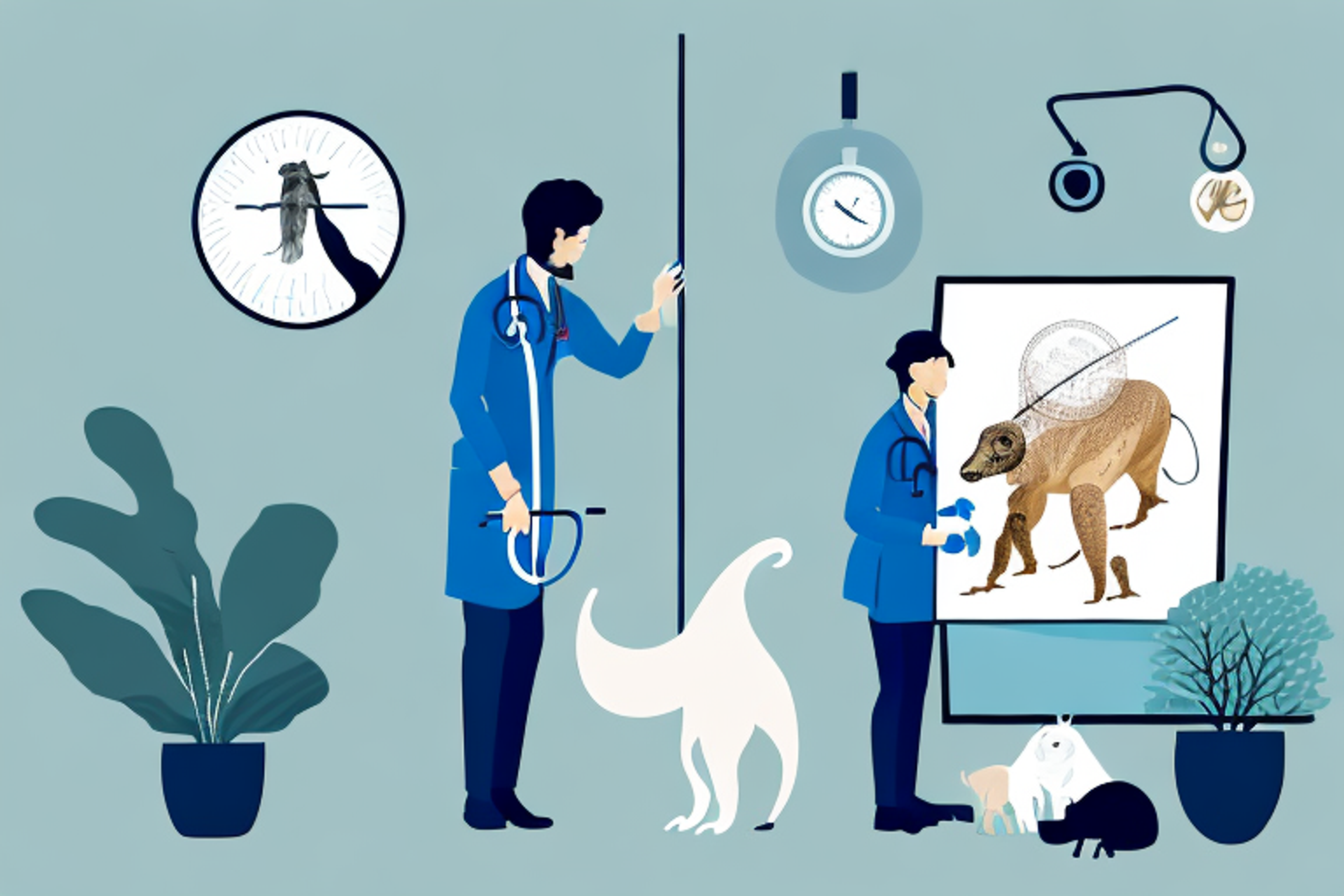Zoological Veterinarian: What It Is and How to Become One
Discover the exciting world of zoological veterinary medicine and learn how to become a zoological veterinarian.
Posted March 6, 2025

Table of Contents
Are you passionate about animals and their health? Do you dream of working in a unique and challenging environment that combines medicine and wildlife? If so, becoming a zoological veterinarian may be the perfect career path for you. In this article, we will explore the ins and outs of what it means to be a zoological veterinarian, the requirements for pursuing this field, the daily responsibilities of the job, and much more.
The Role of a Zoological Veterinarian in Animal Welfare
Zoological veterinarians play a critical role in the welfare of animals living in captivity, such as those found in zoos, aquariums, and wildlife reserves. They help ensure that animals are healthy, receive proper medical treatment, and have access to a clean and enriching environment. As a zoological veterinarian, you will work closely with both animals and their caretakers to provide comprehensive medical care and prevent the spread of infectious diseases.
Additionally, zoological veterinarians also play a crucial role in conservation efforts. They work to preserve endangered species by providing medical care, conducting research, and developing breeding programs. By working with these animals in captivity, zoological veterinarians gain valuable knowledge that can be applied to the conservation of wild populations. They also educate the public about the importance of conservation and the role that zoos and aquariums play in protecting endangered species.
The Importance of Education and Training for Zoological Veterinarians
If you are considering a career as a zoological veterinarian, you will need to invest significant time and effort into advanced education and training. You will first need to obtain a Doctor of Veterinary Medicine (DVM) degree from an accredited veterinary school. After completing your degree, you will then need to participate in a residency program to specialize in zoological medicine. This training can take anywhere from three to five years, during which time you will gain hands-on experience with a variety of exotic animals.
Once you have completed your residency program, you may also choose to pursue additional certifications or advanced degrees in zoological medicine. This can help you stand out in a competitive job market and demonstrate your commitment to ongoing learning and professional development.
It is also important to note that zoological veterinarians must have strong communication and interpersonal skills, as they often work closely with zookeepers, animal trainers, and other professionals in the field. Additionally, they must be able to work well under pressure and make quick, informed decisions in emergency situations.
The Daily Responsibilities of a Zoological Veterinarian
As a zoological veterinarian, you can expect to have a variety of responsibilities on a daily basis. These can include conducting wellness checks on animals, developing treatment plans and administering medication as needed, performing surgeries, collecting samples for diagnostic testing, and monitoring disease outbreaks in animal populations. You may also be responsible for managing a team of veterinary technicians and educating caretakers and visitors about animal health.
Additionally, zoological veterinarians may be involved in research projects aimed at improving animal health and welfare. This can include studying the effects of different diets on animal health, developing new treatments for diseases, and investigating the impact of environmental factors on animal behavior. As a zoological veterinarian, you will need to stay up-to-date with the latest research and advancements in veterinary medicine to provide the best possible care for the animals under your supervision.
The Requirements for Becoming a Zoological Veterinarian
In addition to completing a DVM degree and a residency program, you will need to become licensed in the state in which you wish to practice. This typically involves passing both a state and national examination. You may also choose to pursue board certification through the American College of Zoological Medicine, which can enhance your job prospects and help you stand out in a competitive field.
It's important to note that becoming a zoological veterinarian also requires a strong understanding of animal behavior and biology, as well as the ability to work with a variety of exotic and wild animals. This means that in addition to traditional veterinary coursework, you may need to take specialized classes in areas such as wildlife management, conservation, and animal behavior. It's also important to gain hands-on experience working with animals, either through internships, volunteer work, or other opportunities.
Specialization Options for Zoological Veterinarians
Once you have completed your residency and obtained licensure, you may choose to specialize in a particular area of zoological veterinary medicine. This can include working with specific animal populations, such as marine mammals or birds of prey, or focusing on a particular area of medicine, such as anesthesia or radiology. Specializing can help you stand out in a crowded field and increase your earning potential.
The Job Outlook and Salary Expectations for Zoological Veterinarians
According to the Bureau of Labor Statistics, the job outlook for veterinarians in general is expected to grow at a rate of 18 percent over the next decade. While there is no separate data on zoological veterinarians specifically, this growth is expected to translate to increased demand for specialists in this field. Salary expectations for zoological veterinarians can vary widely depending on factors such as experience, location, and employer. However, according to the American Veterinary Medical Association, the median salary for all veterinarians in the United States was $93,830 in 2018.
Challenges Faced by Zoological Veterinarians in their Work
Working as a zoological veterinarian can be highly rewarding, but it can also be challenging. You may be required to work long hours, including weekends and holidays, and be on call in case of medical emergencies. The work can also be physically demanding, as you may need to handle large and potentially dangerous animals. Additionally, the emotional toll of dealing with sick or injured animals can be significant.
The Evolution of the Field of Zoological Veterinary Medicine
The field of zoological veterinary medicine has evolved significantly over the past several decades. Advances in technology, such as the use of ultrasound and MRI, have made it easier to diagnose and treat illnesses in exotic animals. Additionally, there has been a growing emphasis on preventive medicine and environmental enrichment for captive animals to promote their overall health and wellbeing.
How to Prepare for a Career as a Zoological Veterinarian
If you are passionate about becoming a zoological veterinarian, there are several steps you can take to prepare yourself for this career. You should focus on getting good grades in science courses, volunteering at zoos or wildlife centers to gain hands-on experience, and researching potential veterinary schools and residency programs. It may also be helpful to seek out a mentor in the field to provide guidance and advice.
Tips for Success in the Field of Zoological Veterinary Medicine
Once you have completed your education and training and are ready to enter the field of zoological veterinary medicine, there are several tips you can follow to ensure success. You should be prepared to work hard and be dedicated to the animals under your care. It is also important to stay up-to-date on the latest advances in medicine and technology, be willing to collaborate with other professionals in the field, and develop excellent communication and interpersonal skills.
Case Studies: Real-Life Examples of the Work of Zoological Veterinarians
Real-life case studies can be a valuable resource for understanding the day-to-day work of zoological veterinarians. For example, Dr. Katie Delk, a board-certified zoological veterinarian, has worked with a variety of animals, from sea turtles to polar bears. In one case, she was responsible for performing a complex surgical procedure on a sea turtle to remove multiple tumors. Thanks to her expertise and dedication, the turtle was able to make a full recovery.
The Future of Zoological Veterinary Medicine: Trends and Innovations
The field of zoological veterinary medicine is constantly evolving, and there are several trends and innovations that are shaping the future of the industry. These include advances in diagnostic testing, such as the use of DNA sequencing and proteomics, as well as a greater emphasis on nutrition and disease prevention. Additionally, there is growing recognition of the importance of mental health and enrichment for captive animals, which may lead to new treatments and therapies in the future.
How to Find Employment as a Zoological Veterinarian
Once you are ready to start your career as a zoological veterinarian, there are several ways to find employment in this field. You can search job boards and websites that specialize in veterinary careers, network with other professionals in the industry, and attend job fairs and conferences. It can also be helpful to gain experience working with animals in a variety of settings, such as wildlife rehabilitation centers or veterinary clinics.
Ethical Considerations in the Work of a Zoological Veterinarian
As a zoological veterinarian, you will be responsible for making ethical decisions on behalf of the animals under your care. This can include decisions about whether to perform certain procedures or treatments, and when to euthanize an animal that is suffering. It is important to approach these decisions with compassion and a commitment to providing the best possible care for the animals under your watch.
Conclusion
Becoming a zoological veterinarian is both challenging and rewarding. It requires extensive education and training, as well as a deep commitment to animal welfare. However, for those who are passionate about working with exotic animals in a unique and dynamic environment, it can be the career of a lifetime. By following the tips and advice outlined in this article, you can prepare yourself for a successful career as a zoological veterinarian.












